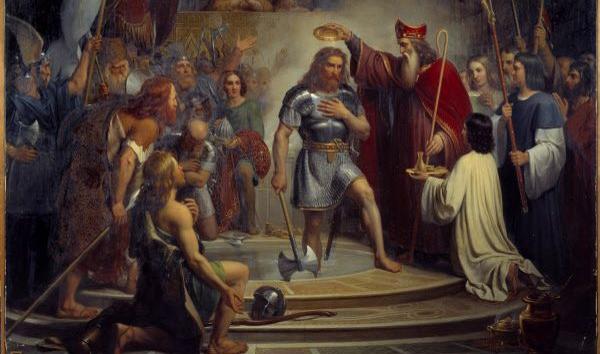It all starts with water.
More specifically holy water.
On December 25, 496, Christmas day, King Clovis was baptized in the cathedral of Reims, by Bishop Rémi.
This sign of the cross drawn on the monarch's forehead marks the entry of the Frankish kingdom into the Catholic Church.
France on that day became
“the eldest daughter of the Church.”
It was John Paul II, on an apostolic trip to France, who popularized this formula, during a speech at Le Bourget in June 1980. He evoked this
“title of pride”
, before asking the assembled faithful:
“France, fille elder of the Church, are you faithful to your baptism? ”
.
Re-used many times since, this expression is based on several elements.
The French King, "Eldest Son of the Church"
It was first used by Father Henri-Dominique Lacordaire, in his
“Discourse on the vocation of the French nation”
, on February 14, 1841, we read in
Since when has France been the eldest daughter of the Church?
, by Bernard Barbiche. He says:
“The Frankish nation was the first Catholic nation given to God by his Church. It pleased the papacy to call our kings the eldest Sons of its Church. Just as God said to his Son from all eternity: "you are my firstborn", the papacy says to France: "you are my eldest daughter" "
. This speech is delivered in a tense context. The last sentence illustrates the support and the bond which unites the Duke of Angoulême, then exiled, who claims to be legitimate sovereign, to the Catholic Church.
This phrase had already been used in the 15th century, in the form
“eldest son”
. On January 19, 1494, Pope Alexander VI accepted the vows of obedience from King Charles VIII, calling him:
“Eldest son”
. The bond of filiation is then created, not between France and the Church, but first of all between its king and the Church. The sovereigns who succeed one another on the throne take up this title again, from François I, who declares himself
"first and sovereign son of the Church"
, to Charles IX, via Louis XIII. This bond of
“son”
, then of
“eldest daughter”
is understood through the prism of the primary mission of the Church: that of bringing children to God. This is what the Lord asks his apostles when he says:
“Go out of all nations, and make disciples, and baptize them in the name of the Father, of the Son, and of the Holy Ghost.”
France, the first missionary country
There are actually two meanings to this formula. First historical. France is one of the first countries to evangelize, the starting point being the baptism of Clovis. The Christian faith undoubtedly came to us from the Greeks, in the South, then by the Latins from Lyon, the first diocese of France. Then theological. Through many missionary organizations, such as the Foreign Missions of Paris, she sends thousands of priests around the world, especially in Asia. The first bishops in Vietnam, Japan and China are French. The country also provided many popes, and it is again a Frenchman, Saint Benedict of Nursia, who is the instigator of the order of the Benedictine monks and of Western monasticism.
The number of French saints recognized by the ecclesiastical institution also sheds light on the meaning of the formula: from Saint Irénée-de-Lyon to Saint Jean-Marie Vianney, without forgetting Saints Martins, Louis, and more recently Charles de Foucauld, canonized on May 15th.
All these elements, at the same time historical, theological and missionary, made that France had an essential role in the development of the universal Church.
And legitimize this bond of mother and eldest daughter.















